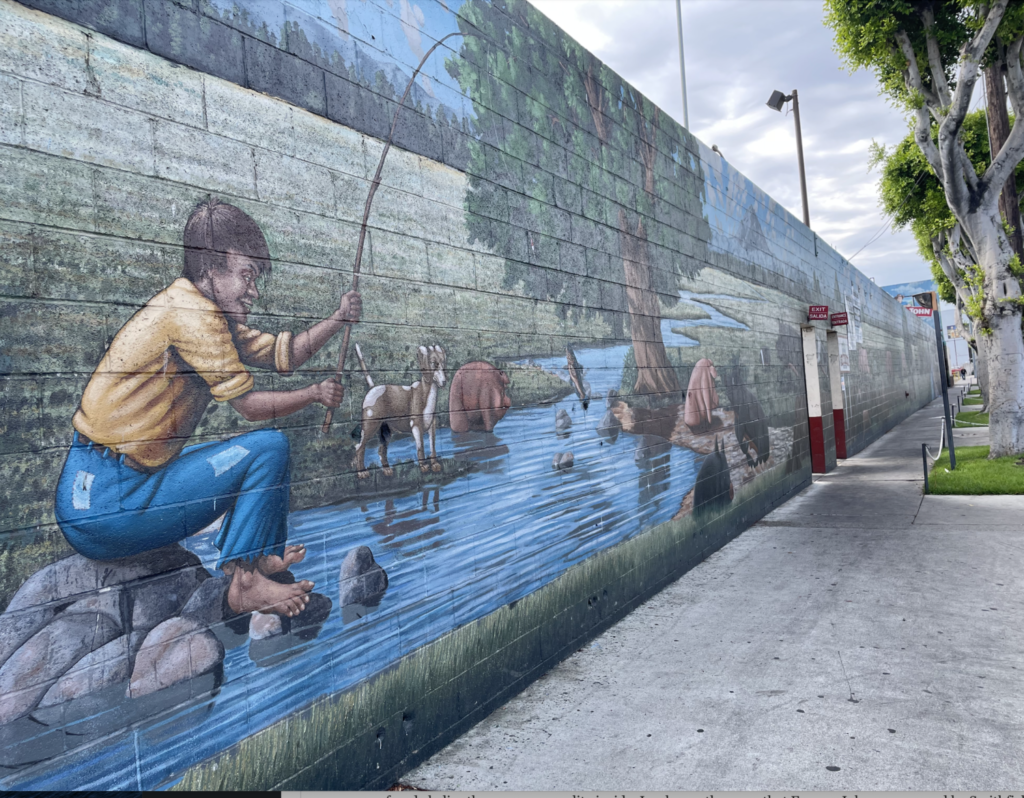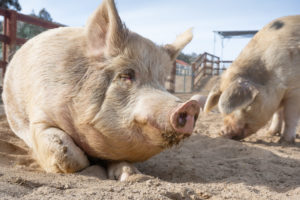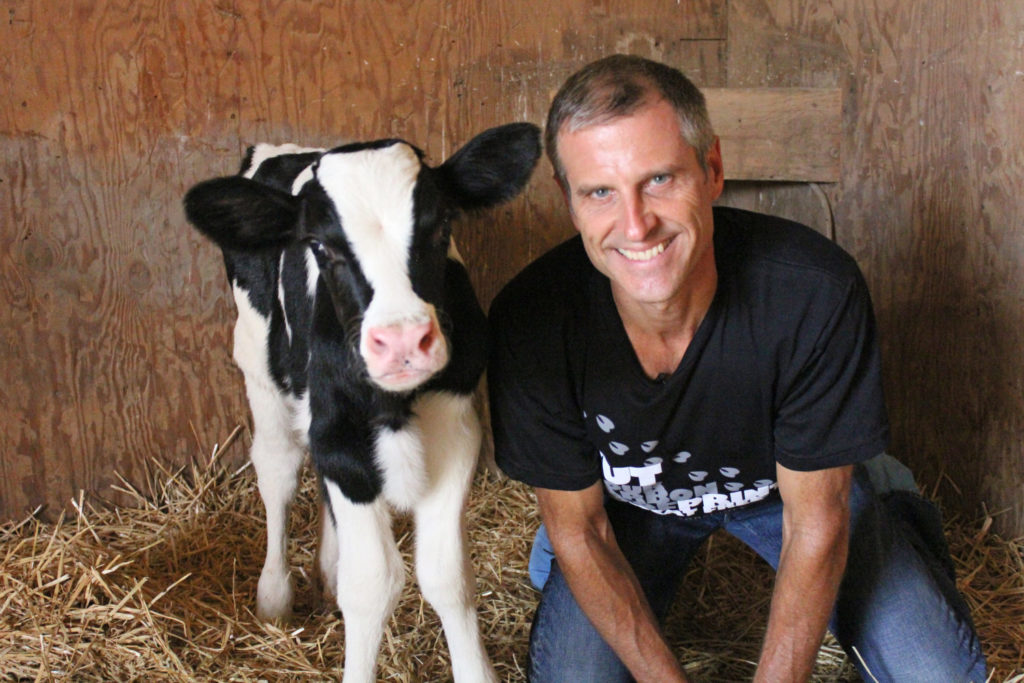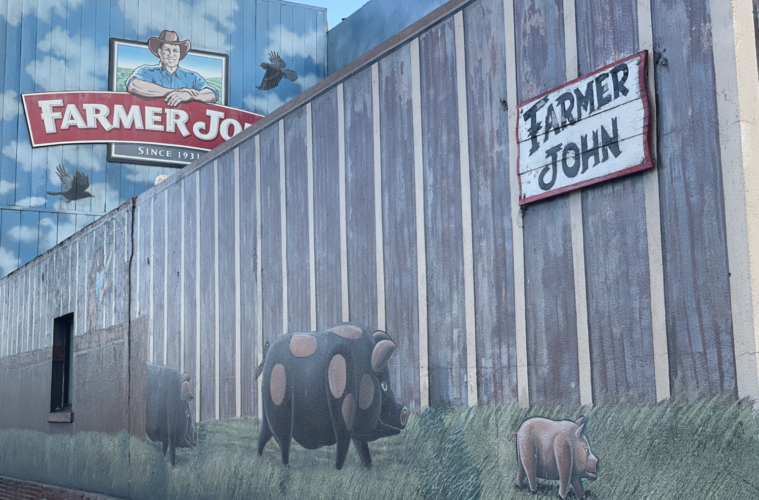This op-ed about the closing of L.A. landmark Farmer John comes from L.A. native, world-renowned activist, and national bestselling author Gene Baur. Baur is President and Co-Founder of Farm Sanctuary, America’s first farm animal sanctuary and advocacy organization, which operates in Acton. Hailed as “the conscience of the food movement” by TIME magazine, for more than 35 years Baur has traveled extensively around the country, campaigning to raise awareness about the abuses of industrialized factory farming and our current food system. Credited with initiating passage of the first U.S. laws to prohibit cruel farming confinement methods, winning the first-ever cruelty conviction at a U.S. stockyard, and inspiring an international farm sanctuary movement, he is author of two national bestselling books: “Farm Sanctuary: Changing Hearts and Minds About Animals and Food” and “Living the Farm Sanctuary Life.”
Growing up in Los Angeles, I remember Farmer John’s “Dodger Dogs” and other products that were marketed with the company’s farm friendly image. Similar illustrations of happy animals and farmers in natural settings compose the iconic murals on the walls surrounding the Farmer John slaughterhouse. The bucolic agrarian façade belies the gruesome reality inside. I welcome the news that Farmer John, now owned by Smithfield, a subsidiary of an international conglomerate, is closing, but I’m also concerned that this news fits a larger, disturbing pattern. Smithfield says Farmer John is closing because they can raise and kill pigs more cheaply outside of California, which means the company will still be able to mistreat animals and workers, to pollute the environment, and to squander increasingly scarce natural resources.
For decades, factory farms and slaughterhouses have externalized costs, while exploiting and hurting less fortunate members of society. During the COVID pandemic, for example, slaughterhouse workers were forced into dangerous conditions, succumbing to high rates of infection and disease, while agribusiness corporations were not held liable. With disruptions in the slaughtering schedule, animals backed up in the system and millions were killed by “ventilation shutdown.” This involves blocking vents and turning up the heat, which results in excruciating suffering and death by heat stroke over the course of hours. This egregious practice was approved by the American Veterinary Medical Association (AVMA) and the United States Department of Agriculture (USDA), and the industry was reimbursed for their “losses.”

Farmer John factory in Vernon (Michele Stueven)
Animals, people, and the earth are suffering and dying at the hands of a cruel and extractive industry that has actively sought to conceal its misdeeds, including by passing “ag gag” laws to prevent investigations and public discourse about its irresponsible and inhumane practices. Despite this, there is a growing awareness about the unacceptable abuse endured by animals on factory farms, and 14 states, including California, have passed laws to lessen animal suffering. In 2018, California voters overwhelmingly passed a ballot measure to limit extreme confinement and to require that pigs, chickens and calves have at least enough space to stand up, lie down, turn around, and stretch their limbs. Still, agricultural operations in California and across the U.S. are not adequately covered by humane, environmental, labor, antitrust and other regulations.
Agribusiness has wielded undue political influence to exempt itself from laws that protect the common good, as well as to garner preferential access to water and other scarce resources, and they also get billions of dollars from government programs every year. Industrial agriculture is destroying family farms and consolidating wealth into fewer hands at the expense of society at large.

Von D. Pig in Acton (Courtesy Farm Sanctuary)
The closure of Farmer John’s Vernon facility is typical of how smaller businesses are acquired by multinational corporations who cut corners to maximize profits. Agribusiness needs to be held accountable for the harm it causes, and it should not receive public funding for destructive practices, but until this happens, citizens can make a difference by “voting with our dollars” and avoiding factory farmed products. Our food choices have profound impacts, and while many things are beyond our control, many of us have intention to eat more mindfully.
California is the nation’s largest agricultural state, and the top grower of organic food. Consumers can eat healthy fruits, vegetables and other produce, while also supporting responsible farmers within the state. California is also the country’s most populous state, and this presents significant markets and opportunities for farmers and businesses. It’s positive to see efforts underway to find new jobs for people working at Farmer John, but instead of helping to move people to other states to kill animals at industrial slaughterhouses, I hope there is a major effort to support jobs and businesses in California that grow foods in a more just and sustainable way. The only constant is change, and with change comes opportunity.
Gene Baur is President and Co-Founder of Farm Sanctuary, America’s first farm animal sanctuary and advocacy organization.

Gene Baur at the Farm Sanctuary (Lee Iovino)
Advertising disclosure: We may receive compensation for some of the links in our stories. Thank you for supporting LA Weekly and our advertisers.

